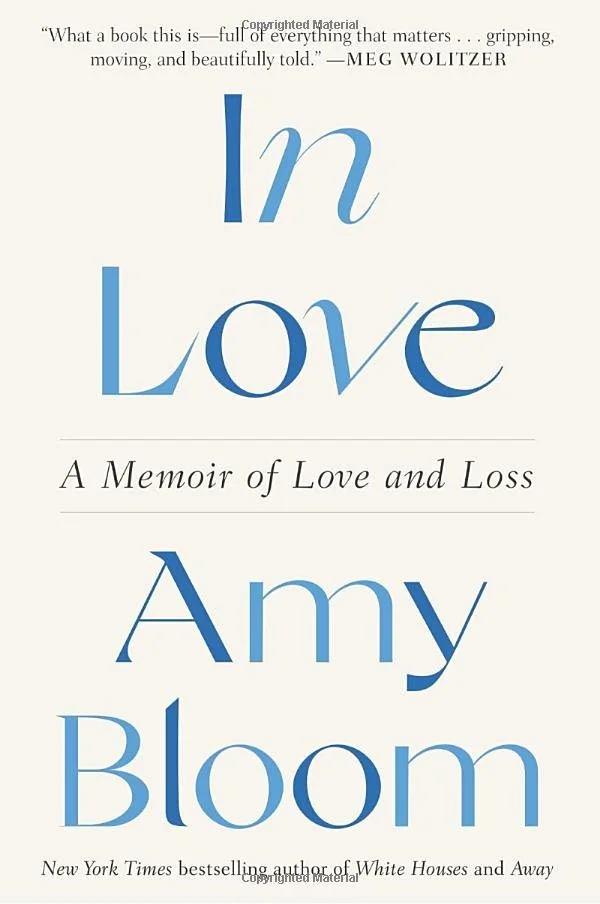We Need the Right to Make Choices While We’re Still Able
Review of In Love: A Memoir of Love and Loss, by Amy Bloom (Random House, 2022)
Can we love someone enough that we help them decide how to die? In her bittersweet, poignant, and often brutally honest story, author Amy Bloom says yes, we can. Diagnosed with Alzheimer’s in his mid 60s, her husband Brian Ameche was smart, funny, robust, and handsome, a former football player used to determining his own course. He decided early on that he would not live with the advanced disease. Like many of us, he – with Bloom’s complete agreement – believed it was his right to choose how he wanted to conduct his life and his death.
A novelist as well as a psychotherapist, Bloom describes the dread, uncertainty, and reckoning that came with the Alzheimer’s diagnosis. She unsparingly assesses her reactions to the changes and turmoil it created in her marriage. With equal conviction, she also conveys the ways in which the relationship deepened, as their time together became even more precious.
The couple navigates the possibilities available for Brian’s ending his life when he decides it’s time. They slowly realize that options in the U.S., no matter where one lives, are not adequate for someone in Brian’s situation. Anticipating that his cognitive abilities would significantly erode but he’d still be physically healthy, they reject the least violent option, voluntarily stopping eating and drinking, for it could take Brian weeks or even an excruciating month to die. What else? Drowning? Run his car into a tree? Overdose of fentanyl? Shoot himself?
Bloom’s recounting of their analysis is anguished, informative, and deeply troubling. Their agonizing over choices may resonate all too well with those of us who’ve gone through it with loved ones, or thought about options for oneself.
The couple decides their best option is with Dignitas, the Swiss self-determination, autonomy, and dignity group. One does not need be a Swiss citizen for Dignitas to provide direct assistance in dying. But, one must be able to travel to Switzerland, meet the organization’s strict criteria for mental competency, and pay the considerable fee. Bloom and Ameche had the financial resources, but the qualification process is lengthy. As time went by, with many steps and missteps involved, Bloom became increasingly fretful that Brian’s waning cognitive abilities would disqualify him from seeing the process through.
This book begs the question of why Americans have to travel to Switzerland to exercise, as Dignitas puts it, “the last human right.” In the U.S., medical-aid-in-dying (MAID) is legal in 10 states and the District of Colombia but must be self-administered and involve terminal illness. None of these jurisdictions would currently allow a person with Alzheimer’s – or any other long-term degenerative condition – to choose that option without a prognosis of six months to live. Bloom notes that “many older or chronically ill Americans harbor end-of-life fantasies” about what MAID laws in the U.S. actually allow.
One of the horrors of Alzheimer’s is that people can live for years, sometimes a decade or more, often in a condition their pre-disease self would find intolerable. True, the decline and cognitive effacement of Alzheimer’s can sometimes be experienced as benign by both the person and their loved ones, and societal forms of recognition and support may be improving. But there are no guarantees against the kind of loss and degradation that Ameche feared and chose to avoid.
It’s time for the movement for dignified deaths to face these kinds of illnesses. This is not to stigmatize those afflicted with Alzheimer’s or any other cognitively crippling disease. Rather, it’s time to establish everyone’s human right to make their own choices for themselves while they are still able to do so - a right already recognized in at least a dozen other countries. It’s for the benefit for all, given that Alzheimer’s, dementia, and other ineluctable conditions can afflict any of us, to live in a society where we needn’t fear a profound loss of control at the end of our lives.

